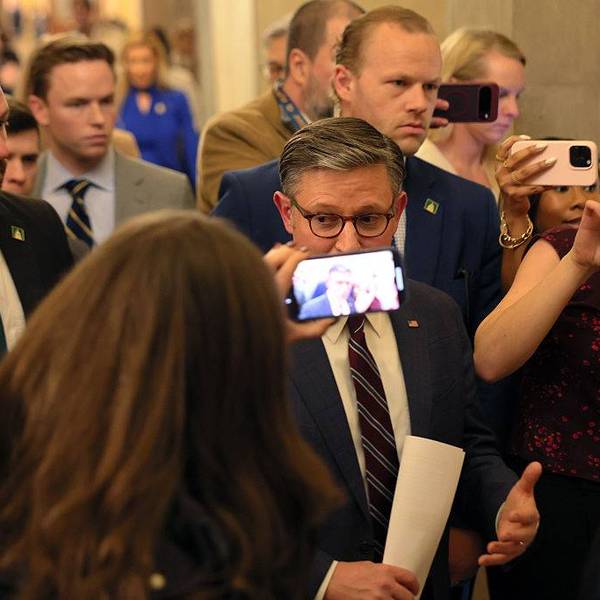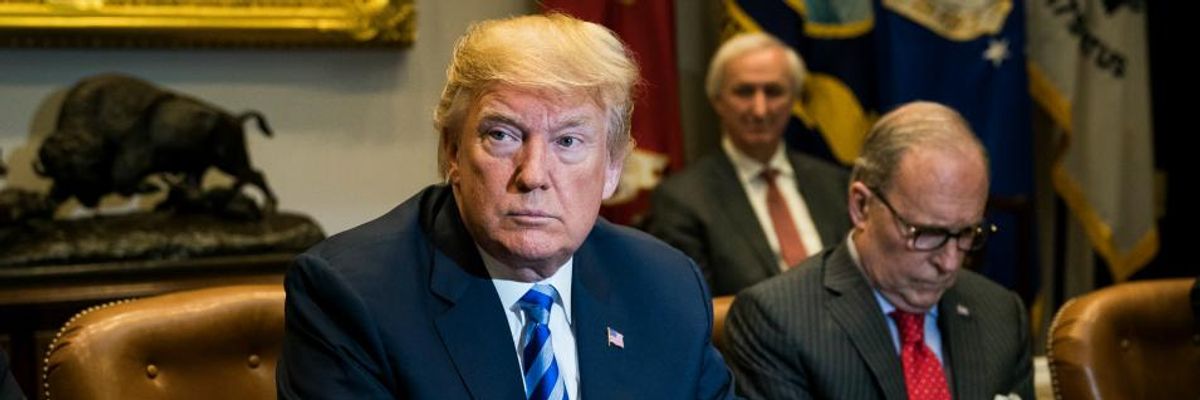Two House Democrats on Friday urged federal agencies to investigate possible insider trading by President Donald Trump or members of his administration after a Vanity Fair story detailed several immensely profitable stock market bets that appeared suspiciously timed around Trump's actions or statements.
"Timing and scale [of the stock bets] raise serious suspicions about whether the traders received material nonpublic information that would affect the S&P and how they received such information."
Reps. Ted Lieu (D-Calif.) and Kathleen Rice (D-N.Y.), in letters to the FBI, the Securities and Exchange Commission, and the Commodity Futures Trading Commission, requested a probe into "potentially unlawful behavior related to the trading of electronically traded futures contracts on the Chicago Mercantile Exchange in the last several months."
"On October 16, Vanity Fair reported on numerous instances in which individuals or groups of individuals made millions, and in some cases billions, of dollars in profits by trading large numbers of Standard & Poor's 500 (S&P) e-mini futures contracts immediately prior to major geopolitical events," Lieu and Rice wrote.
"The trades preceded such events as the Saudi Aramco attack as well as announcements related to progress in talks between the United States and China over the trade war and the withdrawal of the extradition bill in Hong Kong," wrote the Democrats. "In one case occurring in August, the trader or traders made $1.5 billion when the S&P rose after President Trump lied about phone calls taking place between United States and Chinese officials."
"While the aforementioned trades may be purely coincidental," added Lieu and Rice, "their timing and scale raise serious suspicions about whether the traders received material nonpublic information that would affect the S&P and how they received such information."
"We urge you to swiftly investigate whether trading on insider information or any other fraudulent behavior occurred in relation to these trades," the lawmakers wrote.
Vanity Fair highlighted a number of profitable trades since the beginning of the Trump presidency that have been met with a "mixture of shock and awe" among traders.
According to Vanity Fair:
In the last 10 minutes of trading at the Chicago Mercantile Exchange on Friday, September 13, someone got very lucky. That's when he or she, or a group of people, sold short 120,000 "S&P e-minis"--electronically traded futures contracts linked to the Standard & Poor's 500 stock index--when the index was trading around 3010. The time was 3:50 pm in New York; it was nearing midnight in Tehran. A few hours later, drones attacked a large swath of Saudi Arabia's oil infrastructure, choking off production in the country and sending oil prices soaring. By the time the CME next opened, for pretrading on Sunday night, the S&P index had fallen 30 points, giving that very fortunate trader, or traders, a quick $180 million profit.
It was not an isolated occurrence. Three days earlier, in the last 10 minutes of trading, someone bought 82,000 S&P e-minis when the index was trading at 2969. That was nearly 4 a.m. on September 11 in Beijing, where a few hours later, the Chinese government announced that it would lift tariffs on a range of American-made products. As has been the typical reaction in the U.S. stock markets as the trade war with China chugs on without any perceptible logic, when the news about a potential resolution of it seems positive, stock markets go up, and when the news about the trade war appears negative, they go down.
The news was viewed positively. The S&P index moved swiftly on September 11 to 2996, up nearly 30 points. That same day, President Donald Trump said he would postpone tariffs on some Chinese goods, and the S&P index moved to 3016, or up 47 points since the fortunate person bought the 82,000 e-minis just before the market closed on September 10.
One anonymous trader told Vanity Fair he has no doubt these cases involve some sort of wrongdoing.
"There is definite hanky-panky going on, to the world's financial markets' detriment," he said. "This is abysmal."




